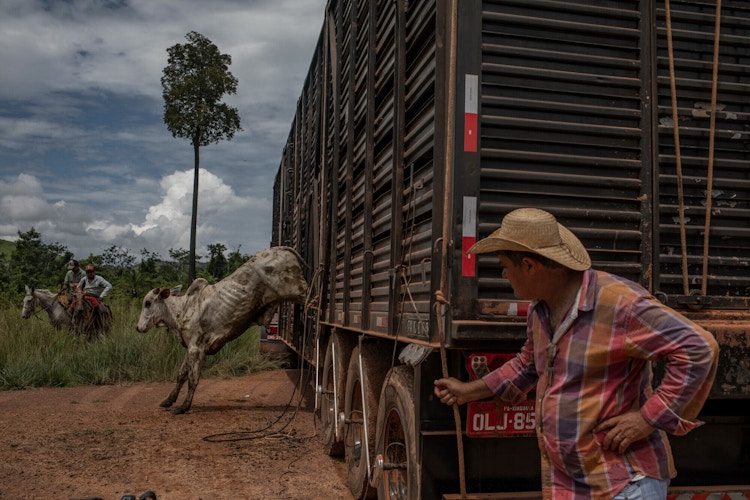New report
Your “Italian” leather could be deforestation leather from Brazil
While the EU attempts to clean up companies’ supply chains, almost half of the leather imported into the EU is non-traceable, concealing potential deforestation and land grabbing, according to a new report.

LEATHER: Workers packing leather in Brazil. Over half of the leather imported into the EU is non-traceable and could be linked to deforestation and land grabbing. Photo: Victor Moriyama/RFN
By Rainforest Foundation Norway.
The leather used in European car seats, furniture, and fashion could be linked to environmental crimes, Rainforest Foundation Norway warns in a new report released today together with AidEnvironment. They recommend that companies exclude the world’s largest meatpacker from their supply chains.
Lack of transparency may hinder EUDR compliance
Cattle ranching in Brazil continues to drive tropical forest loss, with an estimated 80% of Amazon deforestation linked to this industry. As the largest commercial bovine herd in the world, Brazil's cattle sector poses a significant threat to the valuable Amazonian ecosystem.
The report, Hide on the Highway: Tracing Leather from Brazil to Europe under the EU Deforestation Regulation, reveals that the Brazilian cattle sector's lack of transparency and poor governance may hinder compliance with the European Union's new Deforestation Regulation (EUDR).

CATTLE: Grazing land for cattle bordering rainforest in the Brazilian Amazon. Photo: Victor Moriyama/RFN
Meatpacker JBS must fully comply with EUDR regulations
The EUDR requires companies to demonstrate that their leather has not been associated with deforestation or forest degradation since December 31, 2020. The burden of proof will be on European actors placing leather on the European markets, and downstream companies must ensure they source from tanneries with traceable origins.
The report recommends stopping sourcing from JBS, a significant player in the Brazilian cattle sector, due to allegations concerning its supply chain practices.
“We strongly advise downstream actors and end-users in the EU linked to JBS to suspend sourcing from the company until it can be transparently shown that JBS is fully complying with the EUDR”, says José de Melo, a commodity expert at Rainforest Foundation Norway.
JBS profits from both meat and leather
JBS is not only the biggest meatpacker in the world but is also a major leather producer and exporter, likely sourcing from other slaughterhouses in Brazil to meet the global demand for leather. The report shows that JBS owns slaughterhouses and tanneries in Brazil and has subsidiary tanneries in Italy.
“The fact that JBS controls slaughter capacity and tanning processes in both Brazil and Italy is key. The leather lobby has relied on the narrative that the leverage power in addressing deforestation linked to cattle lies within the beef sector alone. Not only has this narrative been dismissed in a previous study, but it also completely ignores how a beef giant like JBS controls several stages in the leather supply chain,” José de Melo adds.
The report concludes that the lack of transparency in the supply chain makes it challenging to trace the origins of cattle and verify environmental and social compliance. Subsequently, this enables illegal activities such as deforestation and land grabbing to go undetected.

Europe must actively engage the leather industry
End-consumers who purchase products labeled as "Italian leather" could unknowingly purchase products originating from Brazil, products made in one country with leather sourced from another, potentially contributing to deforestation. The findings reveal that 45% of sampled leather volumes are listed under the names of logistics companies, further complicating the identification of responsible entities.
“To ensure compliance with the EUDR and mitigate the risk of deforestation-linked products entering European markets, greater transparency, accountability, and adherence to sustainability commitments are necessary within the leather industry,” says de Melo.
He emphasizes the need for European companies and authorities to actively engage with clear guidelines, and robust monitoring and evaluation processes to implement the EUDR swiftly:
“Protecting rainforests from commercially driven deforestation is an
environmental imperative and a moral obligation to safeguard Earth's
biodiversity and climate stability for current and future generations.”
For more information, contact:

José de Melo
Senior Supply Chain Adviser Cattle, Deforestation-free Markets
(+47) 406 15 292
jose@rainforest.no
